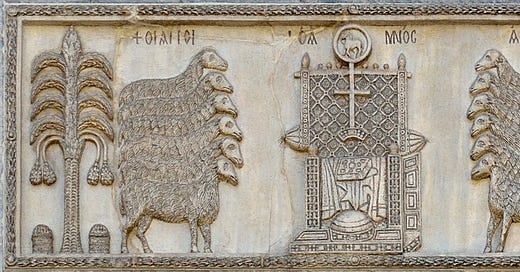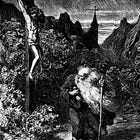Hello again, everyone - long one this time. I am moving house (or trying to) right now so things are slowing down, and suffering a fair bit. There is one more part definitely to come, and then either some more dealing with Benjamin, or some kind of conclusion. We’ll see.
Earlier parts are here:
The Kingdom and the Glory argues that a substrate of metaphysical presuppositions imported into Christianity have a determinative effect on the social order of the West, oriented around the Greek term from which “economics” is derived, oikonomia. For this discussion however I wish to examine the archaeology of glory presented at the end of the volume. Once again to someone philologically minded the initial framing – that “for the ancients as well as for the moderns, the problem is precisely to justify—or at times to conceal—the double meaning, the homonymy and ambiguity of kabhod [sic]: at once glory and glorification”1 signals that the concern here is not in any real sense philological – this homonymy does not exist, as one sense is nominal and the other verbal, and these categories are expressed morphologically. The noun כבוד (kavod) is not homonymic with the root כב״ד (in the basic vocalisation, kavad), the meaning of which entails weight and heaviness, and which only concerns honour or glory when conjugated in verbal forms like נִכְבַּד (nichbad), כִבֵּד (kibeid), or this particular nominal form. There is nothing to justify or conceal here, as the relation between the “subjective” and “objective” forms of the word are simply the shared morphological structure of most words in a Semitic language, being inflections of a tri-consonantal root, features shared with Arabic, Ge’ez or any other Semitic language.
It is clear from this that Hebrew philology is not Agamben’s primary concern. The argument moves quickly to the translation of the word as doxa in the Septuagint, and from there to the New Testament and Church Fathers. Here, that which “was originally an element external to God, one that signified his presence, became—in conformity with the new theological context—an expression of the internal relations of the Trinitarian economy,” the means by which kingdom and government are linked.2 Thus:
If glory is so important in theology it is […] because it allows one to bring together within the governmental machine immanent trinity and economic trinity, the being of God and his praxis, Kingdom and Government […] It allows […] us to bridge that fracture between theology and economy that the doctrine of the trinity has never been able to completely resolve and for which only the dazzling figure of glory is able to provide a possible conciliation.3
This oikonomia is intrinsically trinitarian. In answer to the question “Where does our culture draw the criterion of politicality—mythologically and in fact?” Agamben proffers: “glory, in its dual aspect, divine and human, ontological and economic, of the Father and the Son, of the people-substance and the people-communication.”4 But, crucially:
the center of the governmental machine is empty. The empty throne, the hetoimasia tou thronou that appears on the arches and apses of the Paleochristian and Byzantine basilicas is perhaps, in this sense, the most significant symbol of power […] In opposition to the ingenuous emphasis on productivity and labor that has long prevented modernity from accessing politics as man’s most proper dimension, politics is here returned to its central inoperativity, that is, to that operation that amounts to rendering inoperative all human and divine works. The empty throne, the symbol of Glory, is what we need to profane in order to make room, beyond it, for something that, for now, we can only evoke with the name zoē aiōnios, eternal life.5
This “most significant symbol of power” is the throne that awaits the Second Coming. Thus, while for Agamben the problem of politics is embodied in orthodox Christianity, the solution is not external to it, but rather found in the earliest, pre-orthodox texts of that movement – it is the purported rendering-inoperative of the law by the messiah announced by Paul. While the final argument presented in the book is entirely atheist (note the theme of profanation, a constant theme of Agamben’s work), the foundation on which it is built is not just Christian, but presupposes a developmental model of Christian triumphalism as foundationally necessary for the identification of the substrate on which the contemporary political order is built, and the solution to the problems within it:
from the perspective of theological oikonomia the genealogy of which we have here traced, nothing is more urgent than to incorporate inoperativity within its own apparatuses. Zōē aiōnios, eternal life, is the name of this inoperative center of the human, of this political “substance” of the Occident that the machine of the economy and of glory ceaselessly attempts to capture within itself.6
While Christianity has influenced the political reality of the West, that religion is not necessarily determinative, much less can it be assumed that said religion contains the solution to such problems – or that one can explicate from the theology of “the Occident” the characteristics of something as universal as “anthropogenesis” even if idiosyncratically defined.7
These issues compound in Opus Dei. While the book is ostensibly a critique of the Western ethical tradition, particularly in its full articulation in Kant, the opening of the book is illustrative of the methodological issues that underlie this. The foundational cultural assumptions on which this critique is built are largely drawn from a lexicographical entry from the Theologisches Wörterbuch zum Neuen Testament, edited by Gerhard Kittel. Kittel’s Wörterbuch was a milestone in the lexicography of New Testament Greek, but is now widely acknowledged to be tainted by the cultural biases of both its editor (a member of the NSDAP and contributor to Forschungsabteilung Judenfrage, the Research Section on the Jewish Question) and the broader culture in which it was produced, that of Germany in the 1930s and 40s. This attitude is not absent from this particular entry, “leitourgeō, leitourgia,” by Hermann Strathmann.8
Opus Dei opens with this word and its etymology, quoting many sources directly from Strathmann.9 Strathmann is also the source for his explication of the Septuagint’s translation choices, arguing that the use of this term in the LXX intentionally carries the technical political meaning of a system of obligation to public service rather than the ritual meaning that “liturgy” primarily carries today. It is worth examining how this argument is made in the Wörterbuch. this latter meaning is dismissed tout court:
It has been noted above […] a specialised cultic use had already developed in non-biblical Greek. Are we to conclude that this sacral use of the terms was adopted and expanded? [..] This is hardly tenable. If the words were known to the translators as technical terms in the pagan cultus, and if they had this fact in view, they would surely have avoided them.10
This, however, does not follow, as it is noted that this same lexical paradigm is used to describe pagan cultic service in both Ezekiel and 2 Chronicles two pages earlier.
Rather than explicating this, we get the following:
It is more likely that they were thinking of the older official or technical political use in which the words denoted a ministry on behalf of the whole which was legally ordered and which was invested with great solemnity in its chief forms.11
While this argument, in which the Levitical Priesthood is emphasised as political in contrast to a more immediate religiousity characteristic of the prophetic age and early Christianity is not reproduced wholesale by Agamben, he does take cues from it, identifying this vocabulary choice as intended to “reinforce” the cult’s “‘political’ meaning” envowed to the polity of Israel, which “sanctifies it insofar as it is a nation.”12
From here Agamben precedes to argue from the words’ usage in Hebrews for a framework in which, in contrast to the imperfect order of the Levitical priesthood, who are but a shadow of what is to come, Jesus:
accomplishes a liturgical action that is […] absolute and perfect and that for this reason can be carried out only once […] In this sense Christ coincides without remainder with his liturgy—he is essentially liturgy—and precisely this coincidence confers on his liturgy its incomparable efficacy.13
In this way “the author of Hebrews remains faithful to a genuine messianic inspiration, on the basis of which […] it is not possible to found any cultic liturgy,” and, as a result, “the high priest of the new covenant [i.e. Jesus] has irrevocably closed the door of the temple behind him.”14 This paves the way for the affirmation of the judgement of Lutheran theologian Rudolf Sohm, that “the primitive church [was] a charismatic community, within which no properly juridical organization was possible” and therefore “there can be no power or official appointment in Christendom which should have legal authority over the congregation.”
As a result, something has gone wrong when Church hierarchy and priesthood emerges, epitomised in the later writings of Clement. While the radical form of this argument is drawn from Sohm, it does not deviate significantly from the Wörterbuch in substance, nor in citations, bar for in one place.15 The crux (so to speak) of Agamben’s recapitulation of Sohm’s position over the more systematic one of Strathmann is in the treatment of Rom 15:16, where Paul is:
…to be a minister [leitourgon] of Jesus, the messiah, to the nations in sacral service [heirourgounta] of the good news of G-d, so that the offering [prosphora] of the nations might be acceptable, sanctified by the holy spirit.
Here, “commentators project onto leitourgos the cultic meaning of hierourgeo,” the word that follows it, meaning specifically sacred ministry, used throughout Josephus to describe the activities of priests. This semantic transference Agamben argues is not possible, as Paul’s “polemical meaning” disallows his connection to the cultic, requiring the word’s “proper meaning as ‘one entrusted with a community function.’”16 It is unclear why Paul’s supposed polemic cannot also be semantically determined by the cultic language which also exists in the verse.17 This is the reason Strathmann gives for preferring that reading in this case: alongside hierourgeo, the “final clause” of the verse explains the function of the action described, in which he “wins the Gentiles to the Christian faith” and thus they are “an acceptable sacrifice” – clearly cultic and sacral language – language, that, while Agamben asserts Paul “does not intend to confer a sacrificial aura” includes the word prosphora: offering or sacrifice, the very thing that in Hebrews is annulled (10:14, 18, clearly parallel and equivalent to thysia), and which Paul offers in Acts 21:26.18 There is no reason to restrict sacral cultic function entirely to the operation of the Temple, particularly given the word’s previously noted use to describe foreign cults. Likewise, certain Pauline attitudes resemble those of the Yachad at Qumran, who had abandoned the Temple entirely considering it profaned yet still performed their own sacral rites.19 This throws into question the conclusion that:
In the Pauline letters, which mention episkopoi and diakonoi (in Colossians 1:25, Paul calls himself a diakonos), particular attention is dedicated to the various functions carried out in the community, none of which is defined in priestly terms.20
This in turn undermines the idea that Clement’s language, in contradistinction to Hebrews in which liturgy in the cultic sense ends with Jesus, innovates by asserting the “relation between the hereditary order of the Levites and that of the apostolic succession in the Church” which would become the norm.21 If Paul, himself self-identified as Apostle and Daikonos describes himself in liturgical language Clement may not be innovating at all, but rather the post-Pauline author of Hebrews.
Why does Agamben go to such lengths to exclude Paul from the cultic use of this terminology? It is not necessary for the argument that Christianity plays a pivotal role in the development of European politics, both theoretical and actual. But what it is necessary for is excluding Paul from this development, which positions Paul’s “messianic” message as a viable solution to the problems that are identified. This, however, comes at a price beyond simple philological rigour. The argument that liturgy is necessarily political, and that the development of Church hierarchy was a rejection of the liberation from a legalistic, politicized priesthood promised by the “genuine messianic inspiration” of both Paul and the author of Hebrews tacitly reproduces a belief popular among a subset of German Lutherans a century ago and now widely rejected as an antisemitic caricature of Second Temple Judaism.
By affirming a developmental model of tradition of the Occident, in the movement from Judaism to a Christianity which degrades in its institutionalisation (a sectarian position), Agamben reproduces the retrojection of a particularly modern ideology and particularly modern biases – particularly those of 19th and 20th century German Lutherans.
Agamben then moves to engage with Heidegger to advance what has become a discussion of “operativity” drawn from liturgical practice as it develops in the Church.22 This work is from the period in which he recuperates Nietzsche’s concerted attack on the dual traditions of Christianity and Judaism as a world-historical occlusion of the Being of beings, obscuring the truth of philosophy and thus of authentic action in the world. In this period, for Heidegger, “the biblical-Christian faith in creation” masks “the primordial Greek essential character of Being” which “is once and for all misunderstood […] The tradition of the truth about beings which goes under the title of ‘metaphysics’ develops into a pile of distortions, no longer recognizing itself.”23 He couches this in the priority of actualitas over energia, which is revised by Agamben into the pair dynamis and energia, a paradigm where the fullness of potentiality is reduced to effectiveness, rendering the question of being one of operativity:
being and acting today have for us no representation other than effectiveness. Only what is effective […] is real: this is the extent to which office, under the guise of the humble functionary or the glorious priest, has changed from top to bottom the rules of first philosophy as much as those of ethics.24
Here modern governance indicted by way of analogy with the priestly service in the Jerusalem temple.
For Agamben, this Heideggerian process by which the breadth of dynamis, including impotentiality, is occluded culminates in Kantian ethics, in which “The ontology of command and the ontology of operativity are therefore closely bound,” and thus “The problem of the coming philosophy is that of thinking an ontology beyond operativity and command and an ethics and a politics entirely liberated from the concepts of duty and will.”25 This thinking-beyond is pointed to via messianism, presenting a model in which the law, alongside “every ruler and every authority and power” will be rendered inoperative.26 Implicit is that the mistake of Heidegger is to reject his earlier account of the moment of originatory Christianity as an authentic manifestation of liberation (at least in potentia).27 In doing so, the late-Heideggerian paradigm is not substantially revised, but rather re-harmonized with the Earlier Lutheran position expounded in his seminars on Paul, where Heidegger states that “the original Christianity should be grounded from out of itself, without regard for pre-given forms of religion, such as the Jewish-pharasetical.”28 The moment of the new, the primitive church, in the actualization of Messianism rather than hope for a future salvation constitutes a breaking of the veil – or a tearing of the curtain (Mark 15:38) – a revelation later occluded by the development of the formal, Catholic Church and the Scholastic tradition.
next part:
The Kingdom and the Glory, in Agamben, Omnibus., 553-4.
Ibid. 554.
Ibid. 580.
Ibid. 670.
Ibid. 370-1.
Ibid. 600.
Ibid. 599, immediately prior to the above quotation and throughout The Sacrament of Language and several other later works.
Hermann Strathmann, "λειτουργεω, λειτουργια, λειτουργος, λειτουργικος," in Theological dictionary of the New Testament, ed. Gerhard Kittel, G. W. Bromiley, and Gerhard Friedrich (Grand Rapids: Eerdmans, 1964).. Cited in Opus Dei, in Omnibus. 653-9. Agamben’s Aristotle citations are also reproduced in Strathmann.
Opus Dei, in Omnibus., 653-4; Strathmann, "λειτουργεω, λειτουργια, λειτουργος, λειτουργικος.", 4:216 n5-6; 217.
Strathmann, "λειτουργεω, λειτουργια, λειτουργος, λειτουργικος.". 222.
Ibid.
Opus Dei, in Omnibus. 655.
Ibid. 658.
Ibid.
Strathmann, "λειτουργεω, λειτουργια, λειτουργος, λειτουργικος." 222, 228.
Opus Dei, in Omnibus., 656.
Cf. the careful middle ground in this issue in Robert Jewett and Roy D. Kotansky, Romans: A Commentary, ed. Eldon J. Epp, Hermeneia--a critical and historical commentary on the Bible, (Minneapolis: Fortress Press, 2007). 904-5. Jewett and Kotansky do not project the meaning of the latter word back onto the former but rather read both words in context.
Strathmann, "λειτουργεω, λειτουργια, λειτουργος, λειτουργικος." 230.
See the scrolls from Qumran entitled the Hodayot (psalms of thanksgiving), and “Songs of Sabbath Sacrifice.” For the connection between these beliefs and Paul see Matthew Thiessen, Contesting conversion : genealogy, circumcision, and identity in ancient Judaism and Christianity (Oxford ; New York: Oxford University Press, 2011)., 67-86, Matthew Thiessen, "Jewish Solutions to the Gentile Problem," in Paul and the Gentile Problem (Oxford University Press, 2016)., 26-7; Fredriksen, "Circumcision is Nothing." 82.
Opus Dei, in Omnibus., 657.
Ibid. 660.
Ibid., 698-700. Cf. Christoph Schmidt, "Monotheism as a Metapolitical Problem: Heidegger’s War Against Jewish Christian Monotheism," in Heidegger’s Black Notebooks and the Future of Theology, ed. Mårten Björk and Jayne Svenungsson (Cham: Springer International Publishing, 2017)., 131-157.
Martin Heidegger, The end of philosophy, trans. Joan Stambaugh, 1st ed. (New York,: Harper & Row, 1973)., 14.
Opus Dei, in Omnibus., 667.
Ibid., 752.
The Kingdom and the Glory, in ibid. 515. See also 521-2; 556-7, 588-9, 596-8, Opus Dei, in ibid. 657-9, Agamben, Time that Remains., passim.
Opus Dei, in Omnibus., 699-702.
Heidegger, The Phenomenology of Religious Life., 48.









